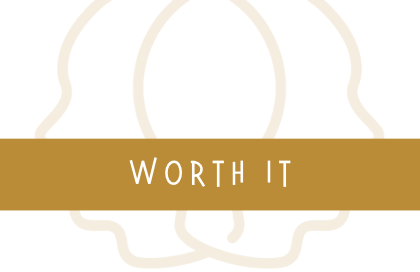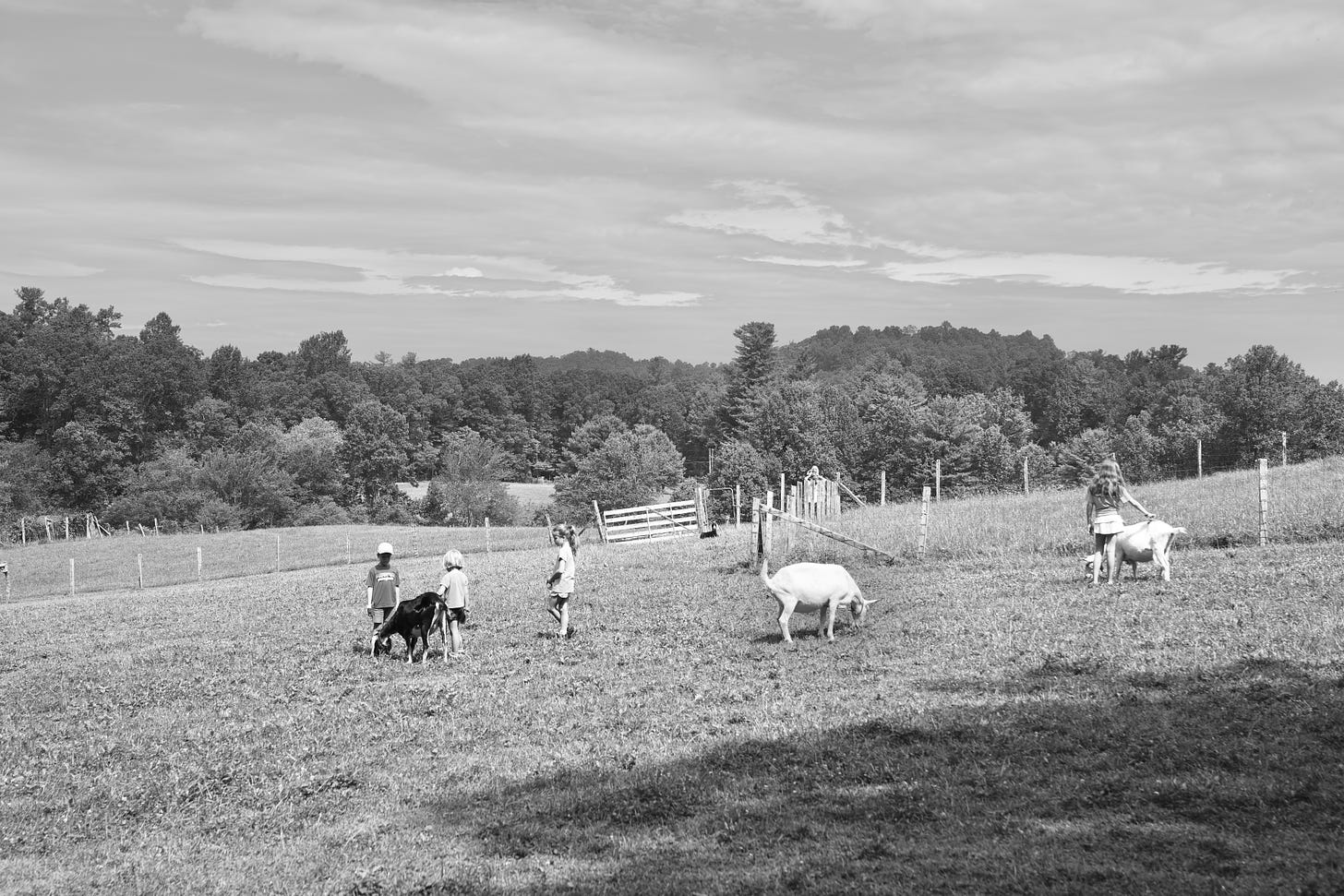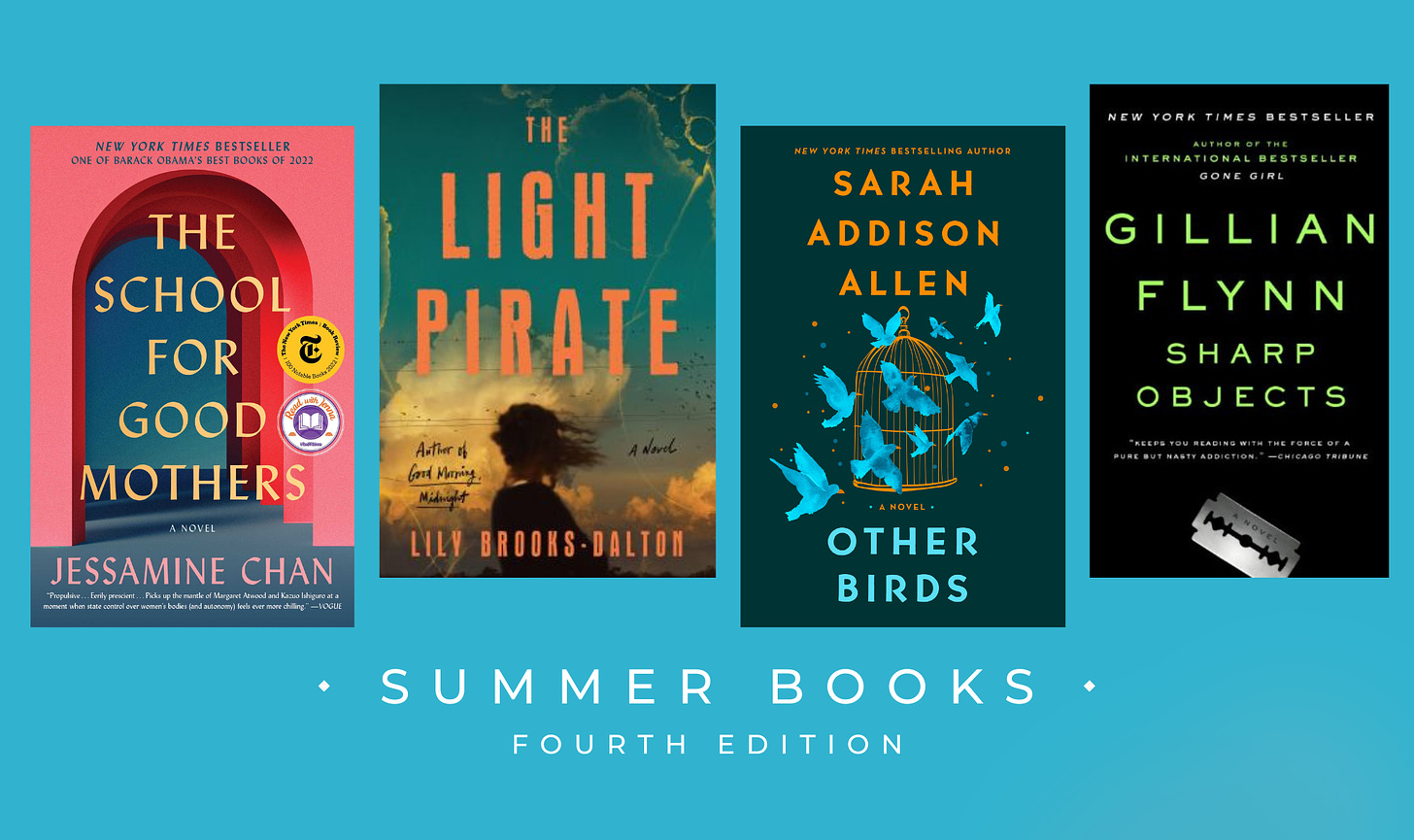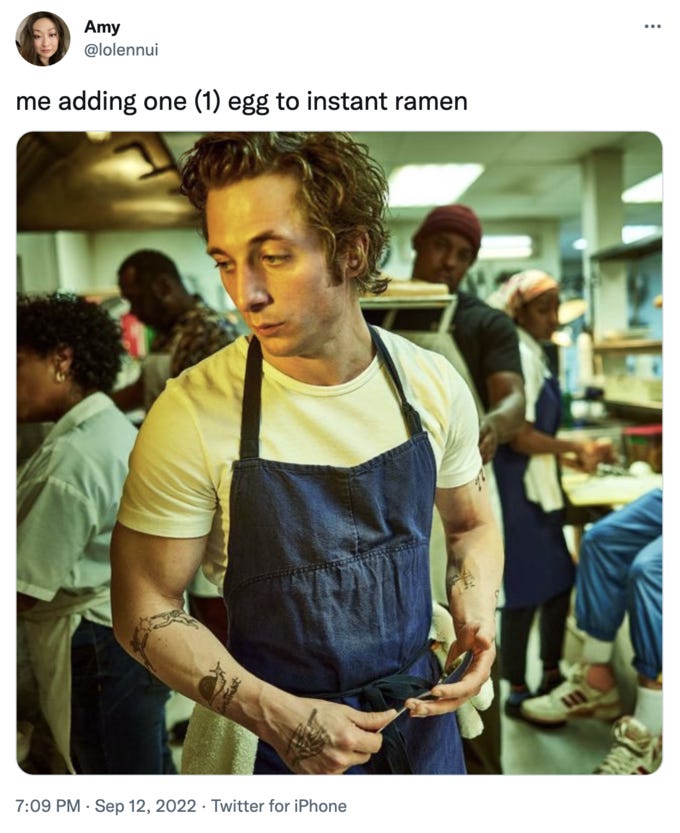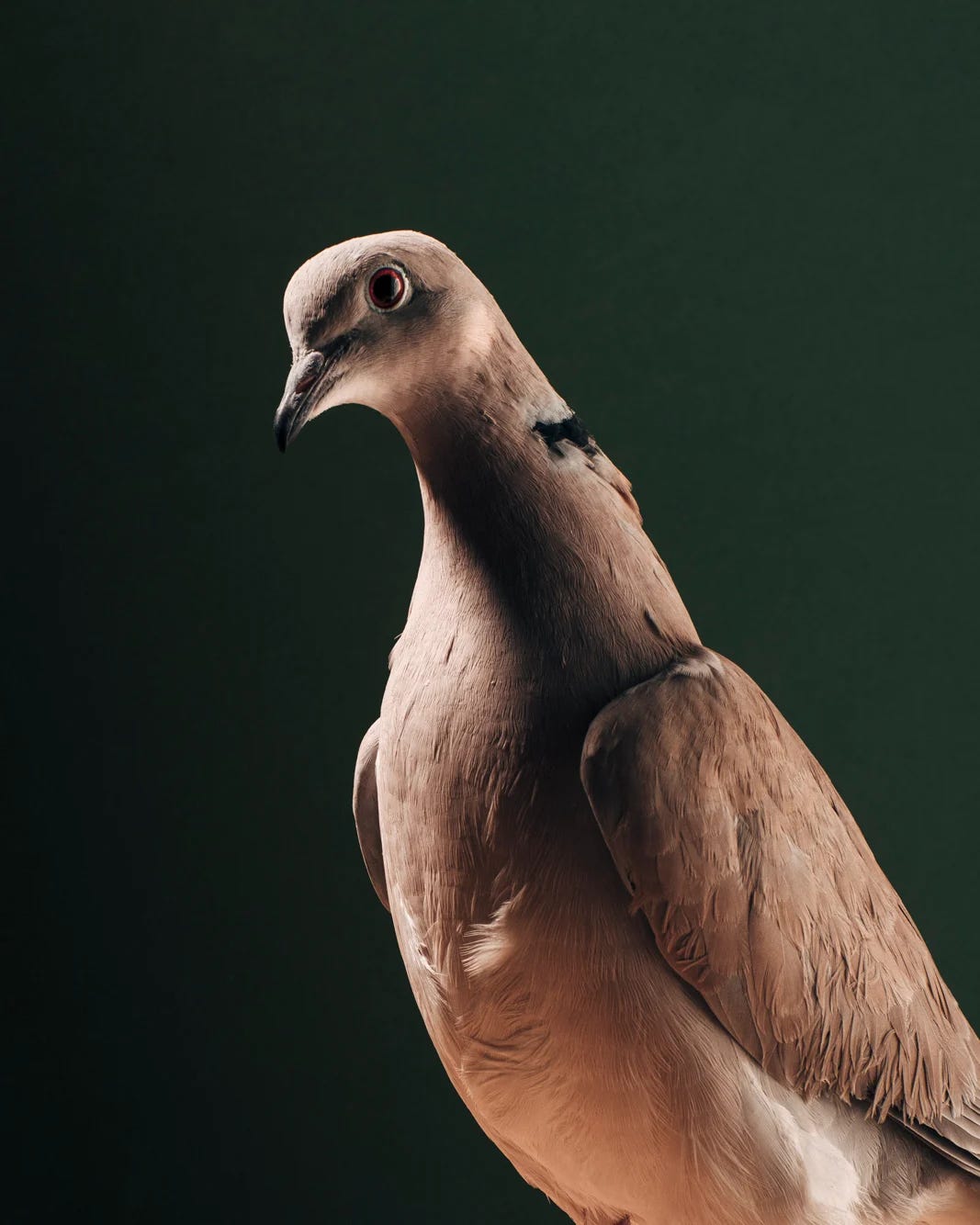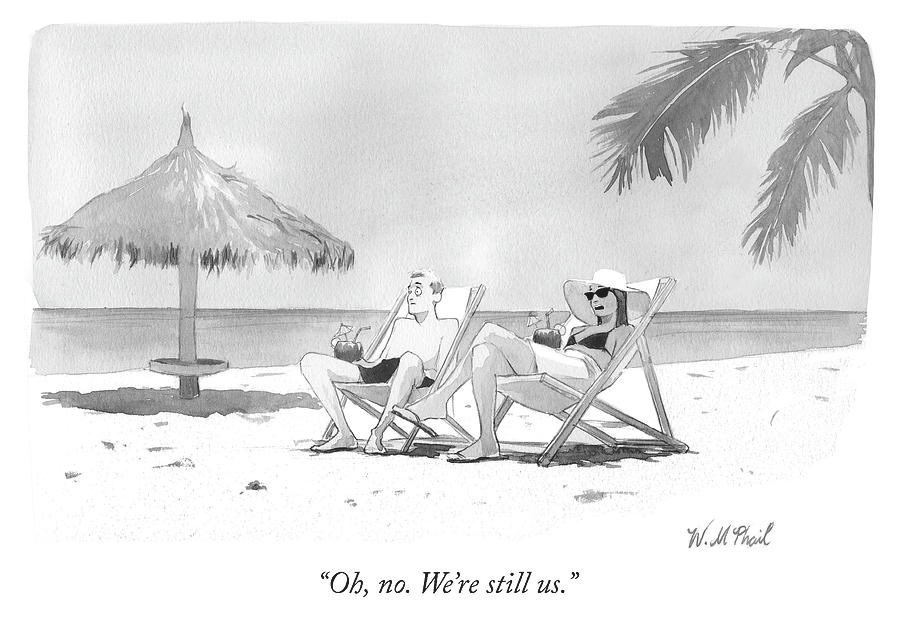Welcome to Worth It, a weekly(ish) round-up of the very best of what I’m reading, watching, listening to, and occasionally even cooking. Only the things absolutely worth your valuable minutes.
My kids returned to school this morning, which means this is my last installment of Summer Books 2023. It also means that today, for the first time in three months, I have built no blanket forts, constructed no tiny houses out of mosaic tiles, visited zero goats, floated in no lakes, sliced zero apples, and monitored no one’s screen time.
What have I done instead? I have made all the appointments I’ve been delaying, returned all the school shoes that were a half-size too small or too big, ordered all the uniforms I should have ordered two months ago, answered all the emails that were beginning to rot and stink up my inbox, and lovingly arranged tennis rackets and cleats and pointe shoes in neat lines so my children can mock me by shoving them in bags and throwing them against walls and leaving them in the driveway as soon as they get home.
Plus I still have time to write this newsletter, and I’m about to make myself—and NO ONE ELSE—lunch. Suck it, Bagel Bites!
And yet. I feel sad because I love summer. As such, it is important that I actively hate people who love fall. I think that, by saying you love fall, you are willing my summer to end. And I think that summer would probably go on forever if you would quit with the scarves and pumpkin spice and boots and definitely quit with the football.
Now, the books.
The School for Good Mothers, Jessamine Chan
This one is a doozy. The first fifty or so pages are e-x-c-r-u-c-i-a-t-i-n-g to read. For me, the experience of the beginning was almost physically painful, and though I didn’t at all want to stop reading, I also remember thinking, “I can’t take much more of this.”
A mother makes a mistake, and because the government has implemented a new oversight program for negligent parents, her child is taken from her. The mistake was not a small one, exactly, but it was not a big one either. The misery of reading the first fifty-ish pages is the helplessness you feel as government-appointed officials intervene, judge, misunderstand, mishandle, and otherwise botch this mother’s “case.”
And then she is sent to a “school,” like a rehab for “bad mothers.” This part is painful too, but also mesmerizing. Very The Handmaid’s Tale. A little bit Klara and the Sun. Throw in some Orange Is the New Black. (The shoulder-devil version of me watched that show.) Altogether, it’s like the crash you practically break your neck trying to watch from your car window.
And it’s an IMPORTANT book—one that raises issues of parental rights and government intervention, the realities of living inside a surveillance state, modern maternal archetypes and the impossibility of doing motherhood “just right.” Some books help you relax; some books make you think.
You should read it, and you should be prepared to squirm.
The Light Pirate, Lily Brooks-Dalton
The Light Pirate is one of those novels that inexplicably manages to be both gorgeous and devastating. The plot is, well, sad… but for many pages at a time, you forget to notice this. The language is just so transcendently beautiful.
You don’t realize it until maybe a third of the way through the book, but the effects of climate change underpin the entire novel. The premise is moving (and disturbing) because—instead of describing some dramatic post-apocalyptic universe a la The Road—Brooks-Dalton gives us a gradual, decades-long unraveling: the electric grid slowly fails in different parts of the US, populations slowly move away from the coasts, people slowly begin spending less time outdoors during the hottest parts of the day. It's easier, I think, to dismiss the possibility of a sudden catastrophe (think: the meteor headed toward Earth in the film Don’t Look Up) as dramatic or silly or unlikely. The Light Pirate is not so easy to dismiss; we sense, I think, that the long trajectory of devastation has likely already begun.
If, like me, you consider the whole global infrastructure a pretty frail system (but you’re also just trying to keep your pantry stocked and your kids in clean underwear), this book will get under your skin. It is very similar to Station Eleven by Emily St. John Mandel, both in tone and theme. In Station Eleven, it’s a flu pandemic that starts unraveling the threads of society; in The Light Pirate, it’s increasingly frequent natural disasters (like hurricanes). But also like Station Eleven, the novel is ultimately about something else: what it means to be human in a world we’d never choose.
The Other Birds, Sarah Addison Allen
I did not like this book.
Just needed you to know that I read it.
Sharp Objects, Gillian Flynn
Gillian Flynn is the author of Gone Girl. If you are one of more than the 20 million people who read that book or watched that movie (I am one of the latter), you probably know what’s in store with Sharp Objects.
What I expected: the book to be compulsively readable and darkly delicious. (Accurate.) What I did not expect: the writing to be superb. (It was! Superb!)
A journalist returns to her small hometown to report on the serial killings of two young girls. The case unravels; the town unravels; the girl unravels.
Fair warning: While I knew the storyline would be dark, I didn’t expect it to be this dark. (I had planned to watch the series after finishing the book, but after being haunted for the past week by a few gruesome images, that’s a no for me.) Still, it’s some good escapism if that’s what you’re looking for, kind of like Big Little Lies or Nine Perfect Strangers. (Or, you know, like Gone Girl.)
The Ezra Klein Show: If You’re Reading This, You’re Probably ‘WEIRD’
I’m not listening to many podcasts these days, but Ezra Klein is my go-to. (Gosh he’s so smart. How are some people so smart? Does he ever take showers or watch tv… or does he just be smart all day?)
This is from the show blurb (I didn’t write it):
In social science, WEIRD is an acronym that stands for Western, Educated, Industrialized, Rich, and Democratic. Most societies in the world today—and throughout human history—don’t fit that description. Much of what we take for granted as basic elements of human psychology and ethics are actually a peculiar WEIRD way of viewing the world. Joseph Henrich, an anthropologist at Harvard University, believes that this distinction between WEIRD and non-WEIRD psychologies as absolutely central to understanding our modern world.
But trust me: it’s more interesting than it sounds.
Rethinking with Adam Grant: Tara Westover
Truth is, I find Adam Grant equal parts annoying and brilliant. But Tara Westover is just awesome. (If you are one of the seven people who hasn’t read Educated, go.)
Here’s a little excerpt, which is about how we communicate with people with whom we disagree. She’s answering a question about how someone managed to change her mind, and she points out that, while preaching at someone almost never works, merely being generous enough to help someone hear their own voice might. (In other words, we are better at changing our own minds than we are at having them changed for us.)1
[00:12:55] Tara Westover:
Well, I think it was because he wasn't attacking me. He wasn't saying “You are the worst person in the world. I can't believe you believe these horrible things. Do you have any idea how horrible it is what you're saying?” He had this incredible way of making me feel like I was good, like, “You’re a good person. I really don't understand how you can believe these things, but you seem great. So help me. Help me understand it.”And I think what that does is that I could hear myself talk. I felt calm enough that I could hear my own self speaking and what I felt in those moments was “I never wanna say this again. I actually don't like saying this. This doesn't feel good.”
And I think it was probably that more than anything he said, I don't remember anything he said. Not a single thing. What I remember is the way I felt when I was speaking and I remember saying things, studies, studies I had read, horrible things that were not true, but I just like, I don't even like saying this. I never wanna say this again. He allowed me to feel calm enough that I could hear myself talk.
The Bear, HBO
I’m assuming you’ve already seen season two of The Bear, but my husband was disappointed that I hadn’t formally endorsed it here. Carmy, consider this my apology.
If you’re a foodie you’ll love it; if you’re a human you’ll love it. Episode 6 will make you want to puke; episode 7 will make you want to cry. When you’re done weeping over Cousin Richie, read this opinion piece by David French.
I’ve seen how we’ve become a nation of bruised reeds, busy breaking one another. We see the rage but we miss the pain. We exclude the very people we most need to include. We lash back to inflict even greater wounds. We forget to seek the virtues hidden under a shell of vice.
Bonus:
This guy feels that pigeons (aka “flying rats”) are misunderstood creatures, so he’s taking formal portraits to restore their dignity. Has ever a worthier project been conceived?
My husband and I went out of town kid-free last weekend. It was actually awesome, but it reminded me of this.2
This is a TED Talk, actually, but I don’t have a banner for that.
Whenever I pack for vacation, I say, “But can I leave my brain at home?” (Turns out, no.)


